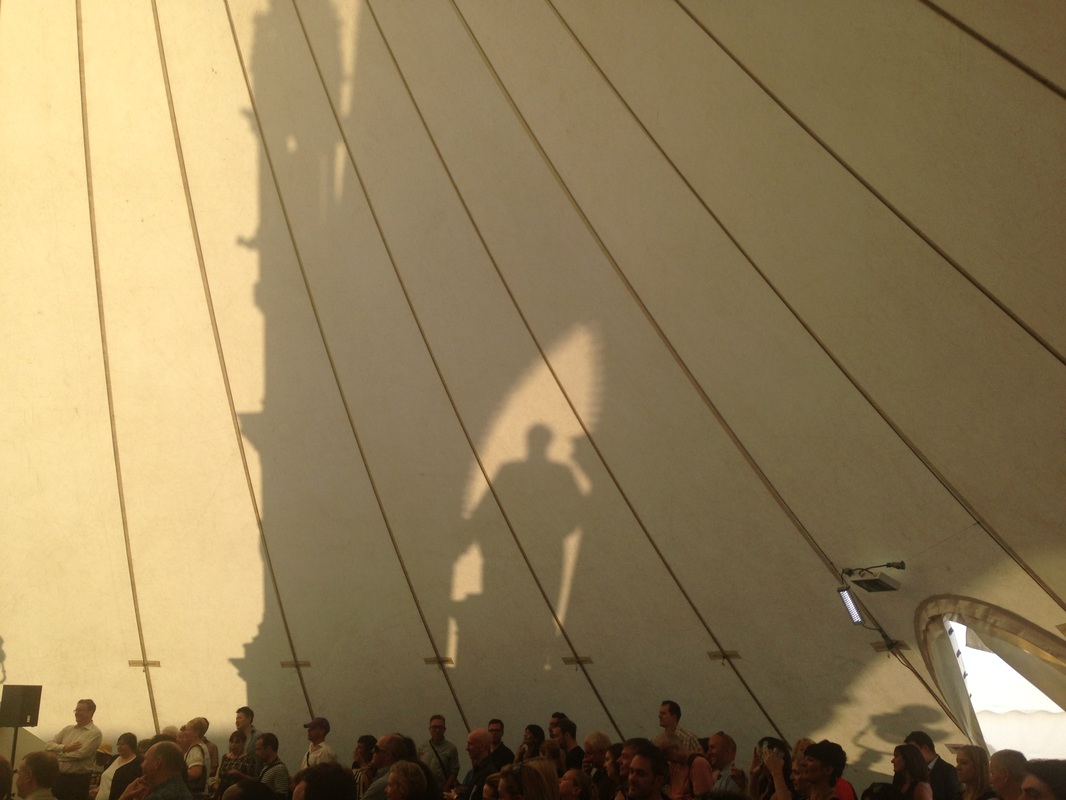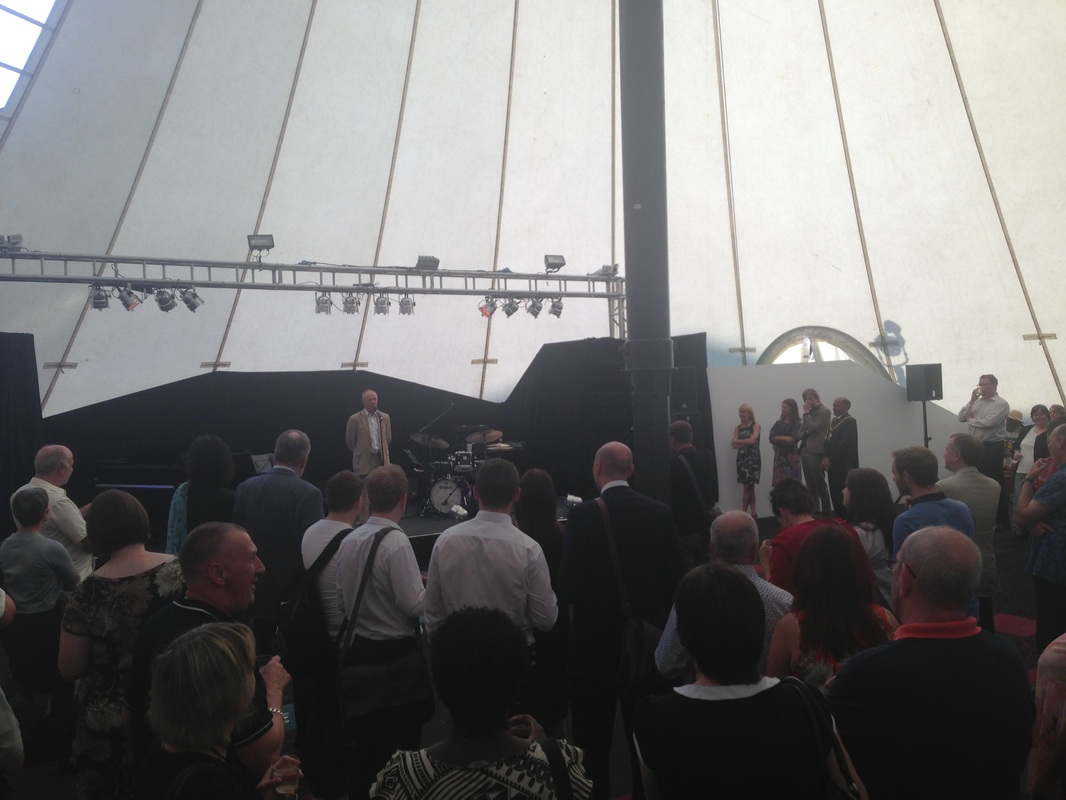IT was a good evening in the tent at Manchester Jazz Festival on Friday 26 July. It was the launch of the festival but what was interesting was that Prince Albert, who died, in 1861 attended the event. See the picture below.
He leaned over the pavilion in the Albert Square and then like one of the Fallen Angels in the Dr Who series edged his way closer and closer to the speakers and the music.
It was a fascinatingly slow dance of a shadow of a statue across canvas as the sun westered.
Earlier in the event Sir Richard Leese, Manchester Council Leader, came over and we had a chat about Manchester International Festival which had finished the previous Sunday.
We thought in many ways it had been the best.
Yep it had been beautiful weather on every one of the eighteen days of the 2013 festival but also the programming had worked better despite the loss due to logistics of the Rite of Spring by Stravinsky. The combination of 'found spaces' and the innovation behind such performances as the xx gig and the Masque of Anarchy from Maxine Peake had been utterly beguiling.
This festival had seemed far more in tune with the city while still wowing audiences and critics from across the world. Perhaps this was down to the fact the programme seemed pared down, simpler, more direct, almost more honest. The 'celebrity' of previous performers in earlier festivals such as Lou Reed, Kanye West, even Damon Albarn, now seem somehow distracting.
Of course there were big names this time around. According to Sir Richard, one show in particular had five American producers scambling into jumbos to scoot the Atlantic. This was Kenneth Branagh’s Macbeth in St Peter’s Church, Ancoats.
But even that show because it was about the play and the interpretation of Shakespeare’s words and not about Branagh specifically, and especially because it was so visceral, and so site-specific, felt very honest.
For me there was something about this official big-budget Manchester International Festival 2013 that felt ‘fringe’. As though the fringe had strangled the centre and usurped its place.
Very Macbeth.
The whole thing also, as Sir Richard noted, felt more focussed on the arts this year rather than crowd-pleasers and because of that had managed along with the runaway success of Festival Square in the sunshine, to be even more of a crowd-pleaser.
All in all this has been a fabulous year for Manchester International Festival.
It even contained an element of family history.
As we waited in Murray's Mills in Ancoats to be taken to the performance of Macbeth I felt a shiver. The last time a Schofield of my family had been in it was with my late Uncle Harold. He had cleared the spinning mules out of Murray's Mills after the factory closed and taken them to Hungary after World War II effectively setting up the Hungarian textile industry as Manchester's failed.
He leaned over the pavilion in the Albert Square and then like one of the Fallen Angels in the Dr Who series edged his way closer and closer to the speakers and the music.
It was a fascinatingly slow dance of a shadow of a statue across canvas as the sun westered.
Earlier in the event Sir Richard Leese, Manchester Council Leader, came over and we had a chat about Manchester International Festival which had finished the previous Sunday.
We thought in many ways it had been the best.
Yep it had been beautiful weather on every one of the eighteen days of the 2013 festival but also the programming had worked better despite the loss due to logistics of the Rite of Spring by Stravinsky. The combination of 'found spaces' and the innovation behind such performances as the xx gig and the Masque of Anarchy from Maxine Peake had been utterly beguiling.
This festival had seemed far more in tune with the city while still wowing audiences and critics from across the world. Perhaps this was down to the fact the programme seemed pared down, simpler, more direct, almost more honest. The 'celebrity' of previous performers in earlier festivals such as Lou Reed, Kanye West, even Damon Albarn, now seem somehow distracting.
Of course there were big names this time around. According to Sir Richard, one show in particular had five American producers scambling into jumbos to scoot the Atlantic. This was Kenneth Branagh’s Macbeth in St Peter’s Church, Ancoats.
But even that show because it was about the play and the interpretation of Shakespeare’s words and not about Branagh specifically, and especially because it was so visceral, and so site-specific, felt very honest.
For me there was something about this official big-budget Manchester International Festival 2013 that felt ‘fringe’. As though the fringe had strangled the centre and usurped its place.
Very Macbeth.
The whole thing also, as Sir Richard noted, felt more focussed on the arts this year rather than crowd-pleasers and because of that had managed along with the runaway success of Festival Square in the sunshine, to be even more of a crowd-pleaser.
All in all this has been a fabulous year for Manchester International Festival.
It even contained an element of family history.
As we waited in Murray's Mills in Ancoats to be taken to the performance of Macbeth I felt a shiver. The last time a Schofield of my family had been in it was with my late Uncle Harold. He had cleared the spinning mules out of Murray's Mills after the factory closed and taken them to Hungary after World War II effectively setting up the Hungarian textile industry as Manchester's failed.


 RSS Feed
RSS Feed